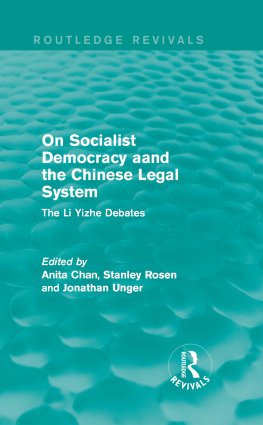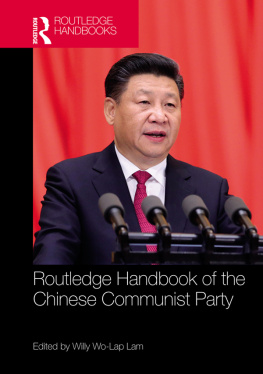Routledge Revivals
On Socialist Democracy and the Chinese Legal System
In 1974, a small group of young intellectuals, the Li Yizhe group, circulated their dissident manifesto, On Socialist Democracy and the Legal System, a probing critique of the leftist authoritarianism of Mao Zedong. This title examines the writings of these dissidents as a means to better understand the views of non-Party Marxists in their struggle to defy the government and construct their own vision of a socialist China. Originally published in 1985, this title remains relevant in relation to contemporary Chinese politics and will be of interest to students of Asian Studies and Politics.
On Socialist Democracy and the Chinese Legal System
The Li Yizhe Debates
Edited by Anita Chan, Stanley Rosen and Jonathan Unger
First published in 1985
by M.E. Sharpe, Inc.
This edition first published in 2016 by Routledge
2 Park Square, Milton Park, Abingdon, Oxon, OX14 4RN
and by Routledge
711 Third Avenue, New York, NY 10017
Routledge is an imprint of the Taylor & Francis Group, an informa business
1985 M.E. Sharpe, Inc.
All rights reserved. No part of this book may be reprinted or reproduced or utilised in any form or by any electronic, mechanical, or other means, now known or hereafter invented, including photocopying and recording, or in any information storage or retrieval system, without permission in writing from the publishers.
Publishers Note
The publisher has gone to great lengths to ensure the quality of this reprint but points out that some imperfections in the original copies may be apparent.
Disclaimer
The publisher has made every effort to trace copyright holders and welcomes correspondence from those they have been unable to contact.
A Library of Congress record exists under LC control number: 85002402
ISBN 13: 978-1-138-19415-1 (hbk)
ISBN 13: 978-1-315-63895-9 (ebk)
ON SOCIALIST DEMOCRACY AND THE CHINESE LEGAL SYSTEM
The Li Yizhe Debates
Anita Chan, Stanley Rosen, and Jonathan Unger, Editors
Cover photo by Richard Baum
East Gate Books are edited by Douglas Merwin, 120 Buena Vista Drive White Plains, New York 10603
Copyright 1985 by M. E. Sharpe, Inc.
All rights reserved. No part of this book may be reproduced in any form without written permission from M. E. Sharpe, Inc., 80 Business Park Drive, Armonk, New York 10504.
Available in the United Kingdom and Europe from M. E. Sharpe, Publishers, 3 Henrietta Street, London WC2E 8LU.
Library of Congress Cataloging in Publication Data
Main entry under title
Socialist democracy and the Chinese legal system.
Bibliography: p.
1. Rule of lawChina. 2. Due process of lawChina. 3. Political participationChina. 4. ChinaPolitics and government1949- . I. Li, I-che. II. Chan, Anita. III. Unger, Jonathan. IV. Rosen, Stanley, 1942-
LAW | 349.51 | 85-2402 |
ISBN 0-87332-341-6 (hard) | 345.1 |
ISBN 0-87332-342-4 (pbk) |
Printed in the United States of America
CONTENTS
Li Yizhe |
Xuan Jiwen |
Yan Yan |
Xi Yan |
Ying Zi |
Du Jian |
Wang Xizhe |
Li Zhengtian |
Li Zhengtian |
Wang Xizhe |
ACKNOWLEDGMENTS
Appreciation goes, first, to Joe Morrison, Ai Ping, Mok Chin-yu, and Ng Chung-yin for their skilled translations. Appreciation goes, too, to Sandee Kennedy, who prepared the final manuscript for publication with breakneck efficiency.
This book is dedicated to the members of the Li Yizhe group, who endured prison for having set their convictions on paper. In particular, we dedicate the volume to Wang Xizhe, who today sits in prison a second time because he would not let his voice be silenced. Readers of his essays may wish to join Amnesty Internationals campaign to secure his release.
The Chinese political system has not been hospitable to political dissidence. From the end of the Cultural Revolution fighting in 1968 up to 1976, the year of Maos death -- an eight year period marked by radical policy-making and political infighting -- only a single significant piece of dissident writing obtained wide circulation in China. This dissident manifesto, On Socialist Democracy and the Legal System, an angrily sardonic essay written in 1974 by a small group of young intellectuals in Canton, probed into the countrys political ailments and sought answers to the breakdown of due process of law. The two major authors of that essay subequently emerged during the democracy movement of 1979-81 as nationally influential writers on questions of bureaucracy, Party dominance, and democratic reform.
This book examines their writings, from the famous On Socialist Democracy and the Legal System through their arrests and release, down to the lengthy 1980 essay Mao Zedong and the Cultural Revolution, an unconventional history of modern Chinese politics whose author soon thereafter was re-sentenced to 14 years imprisonment.
The writings of these dissidents provoke interest on several counts. Parallel to the underground samizdat of Russia, they provide, for one, a means to better understand the range of thinking in China today. Here are non-Party Marxists struggling to define what went wrong in socialist China and to explain how a more humanitarian socialist system could be erected. They are trenchant observers of their own polity, and the issues they raise, the facts they cite, and the interpretations they provide help open windows (in ways that official Party publications do not) into the whys and wherefores of Chinese politics. The very manner in which they are dissidents -- the maneuvers in their writings to protect their own political survival, the alliances their writings sought to build with particular factions within the government -- tells much about how Chinese politics operates.
ORIGINS OF THE LI YIZHE GROUP
According to former Red Guards now in Hong Kong, during the Cultural Revolution fighting of 1966-68 the three authors who subsequently would be linked to the Socialist Democracy essay had belonged to a small but influential Rebel Red Guard group which had pugnaciously titled itself The Red Headquarters Call-to-Arms Combat Group. It had earned a reputation among the student Rebels for militant political argumentation and ideological pronunciamentos, but was not a group particularly active in armed struggle.
Li Zhengtian, author of the first draft of the Socialist Democracy poster, had been a leader of this Red Guard group. Born in 1944, his father had been a Guomindang military officer who had crossed over to the Communist cause during the civil war and had risen high in the ranks. When the Cultural Revolution erupted in 1966, Li Zhengtian had been on the verge of graduating from the Canton Fine Arts Institute. During the following two years of conflict, Li became known among Cantons young people for both provocative posters and a compelling oratorical style. Like many other Rebel leaders in Canton he was detained in August 1968, at the close of the Cultural Revolution fighting, and not released until 1972.













